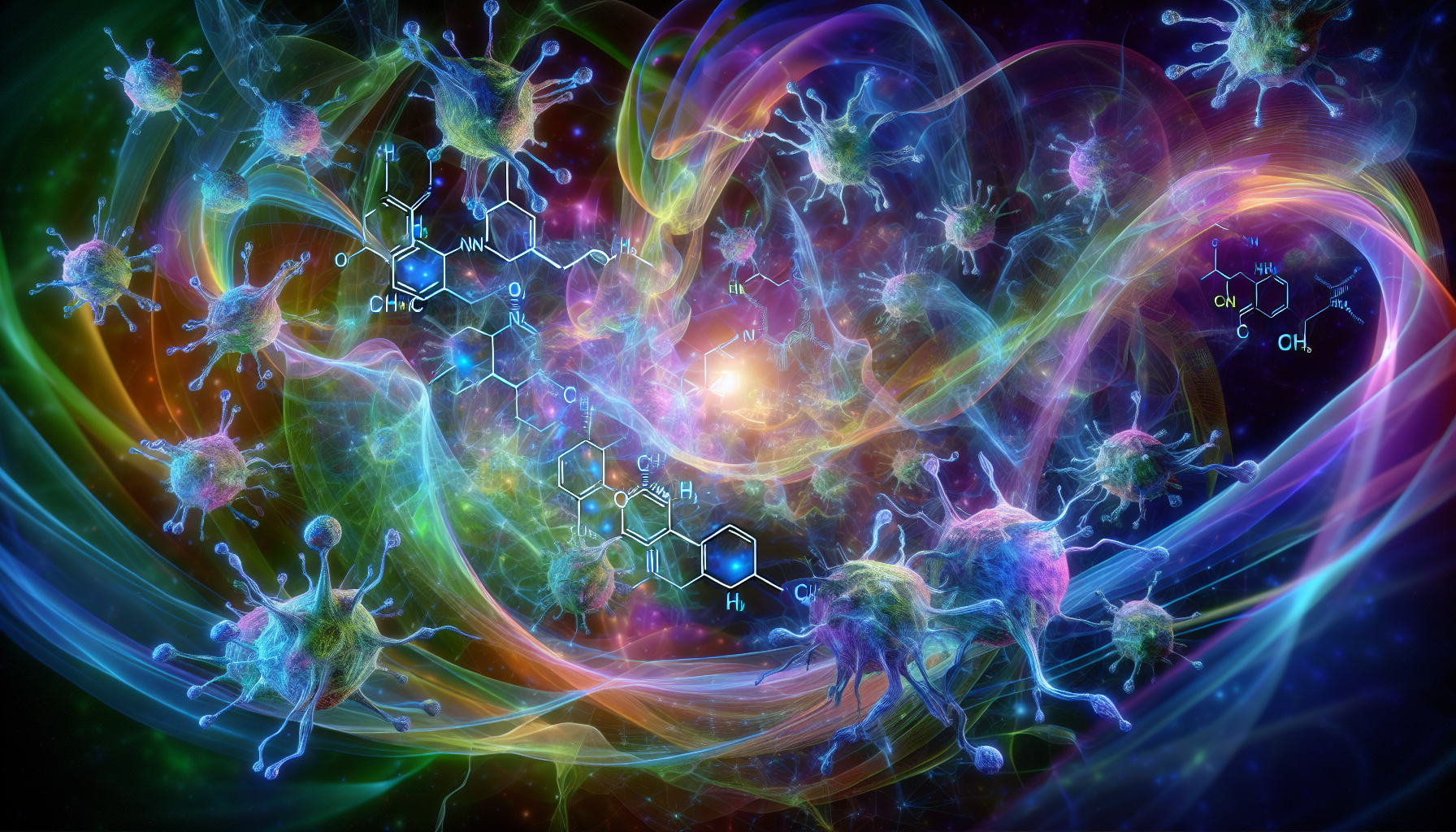What is HHC? Everything about the effects and risks of the new cannabinoid
HHC, or hexahydrocannabinol, is a laboratory-produced, semi-synthetic cannabinoid and is often considered a drug. Unlike THC, it does not occur naturally, but is produced by hydrogenating THC. In this article, you will learn what HHC is, how it works, and what risks it poses.
The most important things at a glance
-
HHC (hexahydrocannabinol) is a semi-synthetic cannabinoid made from THC by hydrogenation and has different effects than THC.
-
The legal situation of HHC in Germany is currently unclear; according to the New Psychoactive Substances Act from April 2024, it will be subject to new regulations and age restrictions.
-
Possible side effects of HHC include dizziness, nausea and anxiety, although individual reactions may vary and comprehensive research on safety is still needed.
HHC meaning – what is behind the abbreviation?

HHC stands for hexahydrocannabinol, a semi-synthetic psychoactive cannabinoid. But what exactly does HHC mean? HHC is not just another cannabinoid that occurs in nature. It is a substance that is produced in a laboratory and is therefore not found in the natural hemp plant.
This makes HHC particularly interesting because it is a hydrogenated derivative of THC. This means that HHC is derived from THC through a process called hydrogenation. This chemical change gives HHC unique properties that set it apart from other cannabinoids.
But why is HHC important at all? The effects of HHC can differ from those of THC, which makes it an exciting subject for research. The legal situation of HHC in Germany is also currently a hotly debated topic. HHC could offer new opportunities for consumers and the cannabis industry, but it also brings its own challenges and risks.
Chemical structure and production of HHC

To truly understand HHC, we need to look at its chemical structure and the manufacturing process. HHC manufacturing often begins with the hydrogenation of THC, which means introducing hydrogen gas into liquid THC. This chemical reaction changes the structure of the THC molecule and creates HHC.
But that's just the beginning. There are several different methods for producing HHC, and each method can result in slightly different products. The chemical structure of HHC and the exact manufacturing process play a crucial role in determining its properties and effects.
Chemical formula and structural formula
The chemical formula of HHC is C21H32O2. This formula indicates the molecular composition of HHC cannabinoids and shows how the atoms are arranged in the molecule. It is important to understand that HHC exists in two enantiomers that differ in their chemical structure.
These enantiomers, also known as 9α HHC and 9β HHC, have different effects in the body. The exact structural formula of HHC is complex, but it is crucial to its effects and potential medical applications.
manufacturing process
The process of producing HHC often begins with the hydrogenation of THC, which involves introducing hydrogen gas into liquid THC. This process produces a hydrogenated cannabis oil (HCO), which can have high levels of HHCA. Decarboxylation of HHCA ultimately leads to the formation of HHC.
However, there are also alternative synthesis routes. For example, HHC can be produced from cannabidiol (CBD) via an acid-catalyzed intramolecular ring closure. This method offers another way to synthesize HHC and vary its properties.
The production of HHC is a complex process that requires both chemical knowledge and precise engineering. Different manufacturers may use different methods to produce HHC, which can lead to variations in the quality and effects of the final products.
Historical background of HHC
The history of HHC begins in the 1940s, when chemist Roger Adams first successfully synthesized HHC from THC. What is HHC? It is a cannabinoid that has great similarities to THC. This discovery opened new doors for research in the field of cannabinoids and showed that it is possible to create new cannabinoids through chemical changes.
Roger Adams' work was groundbreaking and laid the foundation for further research into HHC and other synthetic cannabinoids. Despite its importance, the discovery of HHC is less well known and documented compared to other cannabinoids such as THC and CBD.
Today, HHC is being rediscovered and studied, with scientists and consumers alike interested in understanding its unique properties and potential applications. The story of HHC is a fascinating chapter in the world of cannabinoids that is far from over.
How HHC works in the body

The HHC effect in the human body is varied and complex. HHC can have both relaxing and energizing effects, making it a versatile cannabinoid. These effects result from the interaction of HHC with the body's endocannabinoid system.
HHC affects the endocannabinoid system by binding to cannabinoid receptors, particularly CB1 and CB2. This binding results in a range of physiological effects that can range from relieving stress and anxiety to stimulating appetite.
But how exactly does this bond work? Let's take a closer look.
binding to cannabinoid receptors
HHC works by binding to the cannabinoid receptors CB1 and CB2 in the human body. These receptors are part of the endocannabinoid system, which plays an important role in regulating many physiological processes. Cannabinoids are also relevant to understanding these processes.
The structural similarity of HHC to the body's own cannabinoids enables this binding and results in a variety of effects, including relaxation and relief from anxiety. This interaction is crucial to understanding how HHC works and its potential applications.
comparison with THC
Although HHC and THC are structurally similar, there are significant differences in their effects.
Here are some important points to consider:
-
The psychoactive effect of HHC is considered to be about one third weaker than that of THC.
-
This means that HHC offers a less intense psychoactive experience.
-
This feature makes HHC more attractive to some consumers.
HHC's binding to cannabinoid receptors results in less intense psychoactive effects compared to THC. This can produce a similar relaxing effect but with less severe side effects, making HHC a milder alternative.
HHC vapes offer a modern and convenient way to consume HHC. These vapes offer a milder psychoactive effect compared to traditional THC and are often described as mood-enhancing, making them a popular choice for those who want to experience the benefits of cannabinoids without the intense effects of THC.
Availability and legal status of HHC in Germany

The legal status of HHC in Germany is currently a hotly debated topic. Currently, HHC is considered legal in Germany because it is not listed in the Narcotics Act and is extracted from the hemp plant. This means that HHC products can be freely sold and consumed as long as they do not exceed the legal THC limit.
However, the legal situation is uncertain. Since December 2022, HHC has been monitored by the European Monitoring Centre for Drugs and Drug Addiction, suggesting that the legal status may change in the future. In fact, HHC has been included in the New Psychoactive Substances Act since April 2024, which could lead to further regulations.
In addition, there are age restrictions for purchasing HHC products. In Germany, buyers must be at least 18 years old to legally purchase HHC products. This regulation is intended to ensure that HHC is consumed responsibly.
HHC products on the market

The HHC products market is growing rapidly and offers a variety of options for consumers, including HHC weed, flower, hash, vapes and edibles.
There are several HHC products, including:
-
flowers
-
Hash
-
vapes
-
edible products such as gummy bears
This diversity enables consumers to choose the form of consumption that suits them best.
The availability of these products varies by region, and they are often available in specialized online stores or physical stores. The popularity of HHC products is also reflected in the variety of formats offered, each with its own advantages and areas of application.
Let’s take a closer look at each product category.
HHC flowers
HHC flowers are flowers or buds from cannabis plants that contain HHC. But what is HHC weed? They are industrial hemp flowers that are treated with HHC distillate. These flowers are often extracted from industrial hemp and sprayed with HHC isolate to achieve the desired effect. HHC flowers offer a natural form of consumption and are particularly popular with traditional cannabis consumers.
HHC flowers can be used by smoking or vaporizing. These methods allow for a quick effect and are appreciated by many consumers due to their simplicity and effectiveness.
HHC Vapes
HHC vapes are devices that vaporize liquids containing HHC to allow inhalation. To consume HHC through vapes, the HHC liquid is filled into cartridges and heated with a vaporizer. This method offers a smoke-free way to consume HHC, making it particularly attractive to health-conscious people.
HHC Vapes are available in a variety of flavors including BlueBerry, Lemon OG, and Mango Kush. This variety allows consumers to choose their preferred flavor and enjoy the vaping experience.
HHC Edibles
HHC Edibles include various edible products such as gummy bears, cookies and drinks. Gummy bears are particularly popular and come in a variety of flavors. These products offer a discreet and easy way to consume HHC.
The duration of effects of HHC Edibles can vary between 2 and 6 hours, depending on the amount consumed and the individual's metabolic rate. This long duration of effects makes them ideal for those who prefer a longer lasting effect.
purchase of HHC
Purchasing HHC is possible in Germany for people aged 18 and over. There are a variety of products that contain HHC, including gummies, vapes and flowers. These products are available in specialized online stores and physical stores. Since there are no uniform quality controls for HHC products, it is especially important to thoroughly research the products and the manufacturers before purchasing. Look for reputable suppliers and check the ingredients to ensure you are getting a high-quality product.
Risks and side effects of HHC
Before:
As with all cannabinoids, HHC has potential risks and side effects. The most common side effects of HHC include dizziness, nausea, paranoia, anxiety, and restlessness. These side effects can be particularly noticeable at high doses.
Here is the text with the keyword inserted:
“This article covers the latest trends in technology.”
As with all cannabinoids, HHC has potential risks and side effects. The most common side effects of HHC include:
-
dizziness
-
nausea
-
paranoia
-
anxiety
-
restlessness
These side effects can occur especially at high doses.
Individual reactions to HHC can vary greatly in terms of side effects. Common side effects also include headaches, circulatory problems and psychological problems. The method of consumption influences the intensity and duration of the side effects, with smoking having faster effects.
Edible HHC products, such as gummy bears, have a longer duration of effects, which depends on the individual dose and metabolism. However, there are no long-term studies that examine the health consequences of HHC consumption in detail. Experts therefore emphasize the importance of education and dissemination of information about the risks of HHC.
The quality and purity of HHC products is often uncertain, which poses additional risks. Therefore, concerned consumers should educate themselves about the different forms of HHC and how they work in order to make informed decisions.
Driving after HHC consumption
It is not recommended to drive after consuming HHC. HHC can significantly impair reaction time and concentration, increasing the risk of an accident. The psychoactive effects of HHC can severely limit your ability to drive safely. Therefore, it is advisable to avoid driving after consuming HHC and instead use public transport or other safe means of transportation.
detectability of HHC
HHC can be detected in drug tests. The detectability of HHC depends on several factors, including the amount consumed and the individual's metabolic rate. It is important to know that HHC is a psychoactive cannabinoid that can be detected in the body. If you are required to undergo a drug test, you should be aware that consuming HHC can result in a positive test result.
Addiction and Dependence on HHC
Although there are no comprehensive studies yet on the addictive and dependency potential of HHC, it is important to be aware of the potential risks. HHC is a psychoactive cannabinoid that can lead to dependency, especially with regular and high consumption. It is advisable to consume HHC only in moderation and to educate yourself on the potential risks before consuming. If you notice signs of dependency, you should seek professional help.
Mental disorders caused by HHC
There are reports of users experiencing mental disorders such as anxiety, panic attacks and hallucinations after consuming HHC. These side effects can be particularly noticeable at high doses. HHC is a psychoactive cannabinoid that affects the central nervous system and can lead to mental disorders. It is therefore advisable to consume HHC in moderation and to inform yourself about the possible risks before consuming. If you notice any mental problems after consuming HHC, you should seek medical advice immediately.
expert opinions and warnings
Health experts emphasize that comprehensive research is needed on the safety and effectiveness of HHC. The limited research on HHC means that many of its potential effects and side effects are not yet fully understood.
Regulatory authorities warn of potential side effects and the risk of addiction when using HHC. It is important that users stay informed and seek medical advice when necessary to ensure the safe use of HHC.
Summary
HHC, or hexahydrocannabinol, is an intriguing and relatively new cannabinoid produced by the hydrogenation of THC, offering a unique chemical structure and a variety of potential effects and uses.
Compared to THC, HHC has a milder psychoactive effect, making it attractive to many consumers. It is available in a variety of forms, including flower, vapes, and edibles, each offering its own benefits and uses.
Despite the promising possibilities of HHC, it is important to be aware of the potential risks and side effects. The legal status of HHC is currently uncertain in Germany, and more research is needed to fully understand its safety and effectiveness. Stay informed and make informed decisions to get the most out of this new cannabinoid.
Frequently Asked Questions
What is HHC?
HHC, or hexahydrocannabinol, is a semi-synthetic cannabinoid produced in the laboratory and belongs to a group of compounds derived from cannabis.
How is HHC produced?
HHC is produced by hydrogenation of THC or synthesis from CBD. These processes allow the conversion of existing cannabinoids into HHC.
Is HHC legal in Germany?
HHC is currently legal in Germany, but the legal status may change in the future.
What are the side effects of HHC?
The most common side effects of HHC are dizziness, nausea and anxiety. It is important to be alert to these possible reactions.
Which HHC products are available on the market?
There are a variety of HHC products on the market, including HHC flowers, vapes and edibles. This selection allows you to find the right product for your needs.

Share:
HHC Legal: Current status and consequences of the legal situation in Germany
Spice Nightmare: The Underestimated Danger of Synthetic Cannabinoids